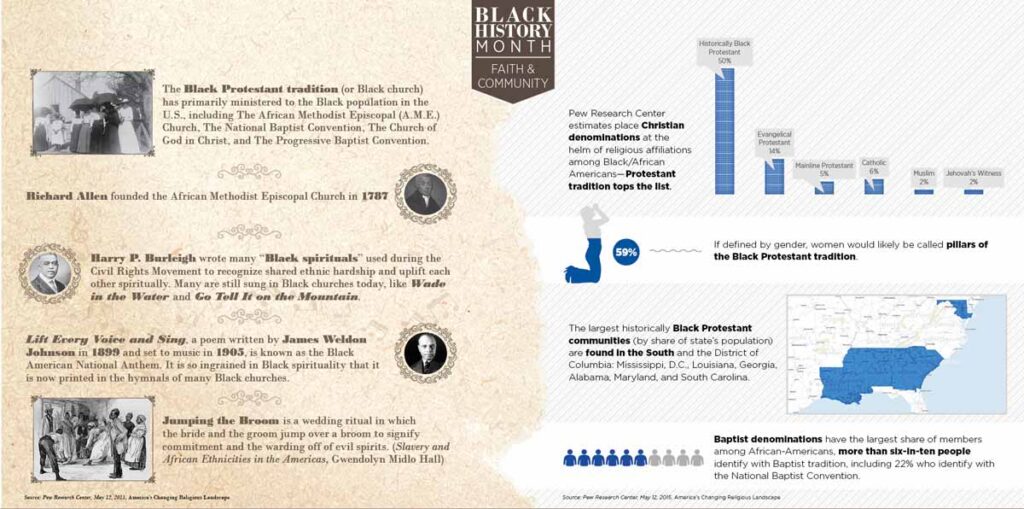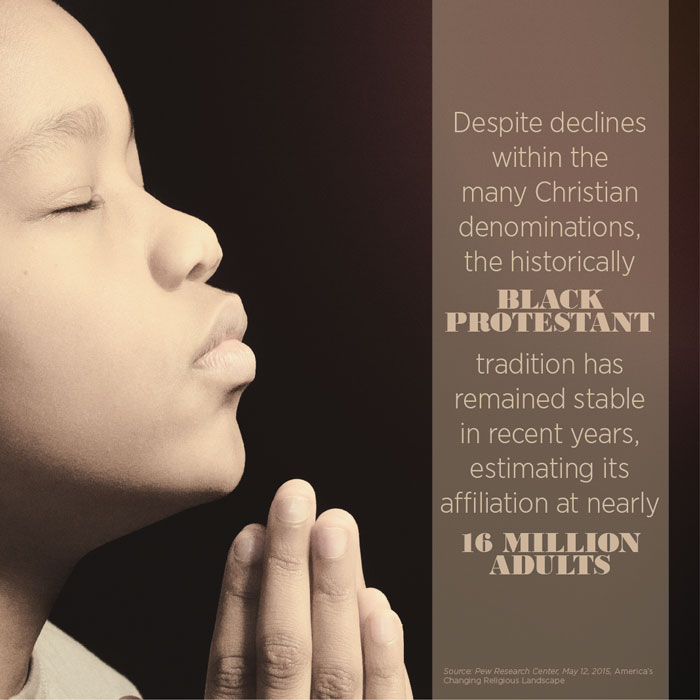
Marketing Insights from Black History Month: A Look at Faith and Community
Filed Under: Black / African American
Ashleigh Williams
Senior Director, In-Person Qualitative Research
When thinking about Black History Month (BHM), it’s important to keep in mind its significance amongst all groups of people. Black culture and its impact on society does not stand in a silo; it permeates to everyone. In last week’s blog that kicked off our series, we focused on history and culture. This week, the series continues with a focus on faith and community. Convinced that non-Blacks also cherish the value of Black History Month and what it represents, we asked our C+R staff (Black and non) what makes Black History Month important and what it means to them on a personal level. The feedback was fascinating and a clear indication that although understanding BHM and the meaning behind it can be similar across cultures and ethnicities, it also varies greatly from the views within the Black community itself.
It is no news that for Black and non-Black Americans alike, BHM represents the reminder of struggle and the fight for equal rights. However, it is also a time to celebrate the accomplishments and contributions Black Americans have made to this country.
“In my opinion, Black History Month is important for us as a nation to recognize how far we’ve come and ensure that we continue to appreciate all of the amazing leaders’ and community members’ contributions to our country and its culture TOGETHER!”
Black History Month brings a narrative of inclusion (and not a monochromatic, Eurocentric perspective), a message that encourages those who aren’t Black Americans to culturally, intellectually and socially open up to others, and perhaps even more powerfully inspires people (including other minorities) to not desist in their aspirations to reach their own cultural milestones.
It is also about filling in the historical gaps to provide a rich and deep depiction of Black culture as a whole, to break free from the cultural stereotypes that bind many today… every day. It’s a look at fertile subcultures that, despite not being mainstream, play a vibrant and important role in social dynamics.
“This is a celebration of Black creativity, resilience, and unique culture that doesn’t always make it to the mainstream. Highlighting Black accomplishments and drawing attention to Black heritage complicates mainstream narratives that flatten Black existence to stereotypes.”

But perhaps most importantly, for many non-Black Americans, BHM is about teaching future generations about embracing differences, about kindness and empathy through the lens of history.
While most Black Americans would agree with these sentiments and fundamentals of BHM, the occasion is often controversial within the Black community. Many struggle with trying to balance their desire to celebrate their heritage and the animosity that stems from feeling boxed in to a particular time of year; a struggle between breaking free from some of the cultural shackles that can still bind them and looking forward to a future where BHM is seamlessly interwoven into American history, more naturally and subconsciously. Movies like Hidden Figures (directed by Theodore Melfi, 2016) do a wonderful job of moving this goal in the right direction.
“Because many of the accomplishments that are reviewed during Black History Month date back to a time when Blacks were still considered an oppressed race of people, it is most important to be able to show my sons that they can achieve their goals in spite of struggles and in spite of any public acknowledgement for having done so.” (AA)
Overall BHM is a reminder that there are universal values that at their core are the same for all cultures and ethnicities. However, as market researchers, we know the way these themes are manifested can be different among cultural groups, making them important to study.
One of these universal truths is Faith and Community, a true cornerstone in Black American culture. The “Black Church” is heralded as inspiring and the true birthplace of the Civil Rights Movement. Leaders like Dr. King organized and mobilized using their church communities. Harry P Burleigh’s Black Spirituals written about faith and the hardships of slavery were and still are used as rally cries for any cause.
“I often ponder the strength of the “Black Church” and the strength it has and continues to provide Blacks as an often suffering people in our country. What an inspiration! To be reminded of these kinds of things through the designation of BHM is so very worthy.”
However, Black churches are more than just the birthplace of the Civil Rights Movement, they have served as “Safe Havens”-where Black Americans come together for worship and

fellowship. They provided food, clothing, housing, and even legal counsel to those in need.
The phrase “it takes a village” truly comes to life here, where youth are raised by everyone in the church community and is still considered a place where family extends past blood lines. Many Black-owned businesses sprouted from the church. It’s the place where elder counsel is cherished and rituals/traditions can be passed down to future generations. To this day, traditions like jumping the broom (a wedding ritual), revivals (week long faith-based celebrations), and Sunday dinners (elaborate weekly dinners after church service) are still very much in practice.
Today, Black Americans are not only made up of Christian protestants (Baptist, AME, and CME) faiths but also Catholics, Muslim, and non-dominations. Understanding faith and community is an imperative component in understanding the African-American mindset and behavior because it is truly at the core of their identity and shapes who they are. A great many cultural themes within Black culture have their foundations or beginnings here.
That is why, to truly build empathy and understand how to get a more genuine connection with the Black community (including the Black consumer) it is imperative to take a look at the roots of this group and its many variants; and importantly, to remember that the Black community pivots as a collectivist culture, one that is rooted in inclusion and collaboration.
Download our factsheet on this cultural theme and how it shapes their mindset of the Black community
explore featured
Case studies

